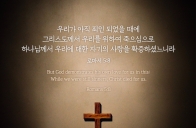아시아와 라틴아메리카 20개국의 선교사, 선교 지도자, 지역교회 지도자 등 비서구 선교운동의 지도자 38명은 지난 5월 1일부터 3일까지 태국 방콕에서 ‘코알라 2차 대회’(COALA2, Christ Over Africa, Asia, Arab and Latin America)에서 다중심 선교 시대에 다수세계 교회의 건강한 선교를 위한 성명을 채택했다. 다음은 코알라 2차 대회 성명서 전문이다.
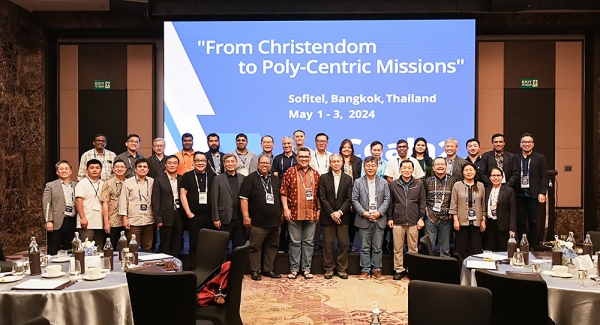 |
코알라2 (COALA2) 성명서
우리 주 예수 그리스도의 이름으로 글로벌 교회와 글로벌 선교운동, 국제 선교 네트워크에 인사드립니다.
아시아와 라틴 아메리카의 선교, 교회 및 비즈니스 지도자 대표들이 2024년 5월 1일부터 3일까지 태국 방콕에서 코알라 2차 대회(COALA2)로 모였습니다. 코알라 대회는 한국 제8차 NCOWE 회의(2023년 6월 13~16일, KWMA 주최)에서 시작된 주요 아시아 및 라틴 아메리카 선교 지도자들 간의 첫 번째 논의로, 코알라 2차 모임을 통해 그 논의를 계속하였습니다.
이번 COALA2 대회에는 비서구 20개국에서 38명의 선교사, 선교 지도자 및 지역교회 지도자가 참석했습니다. 이번 대회는 글로벌 선교가 서구 중심의 기독교 왕국(Christendom)모델에서 진정한 다중심 중심(Polycentric)의 선교로의 변화하는 것을 초점을 맞추어 진행하였습니다. 이번 모임의 주요 결과 중 하나는 다중심 선교 시대에 건강한 다수 세계 선교 참여를 위한 몇 가지 원칙에 대한 권고문이라는 성명서를 채택한 것입니다. COALA2 참석자들이 서명한 “다수 세계를 위한 선교 실천 권고문”은 아래와 같습니다.
COALA는 “Christ Over Africa, Asia, Arab and Latin America”의 약자입니다.
 |
COALA2, 방콕, 2024년 5월 1~3일
다수세계(Majority World) 선교 실천을 위한 권고문
가. 전문
20세기는 지구촌 교회의 모습으로 일대 격변을 목격하고 있습니다. 역사상 최초의 교회의 무게 중심은 서구에서 비서구 또는 다수세계(MW: 아프리카, 아시아, Latin America & MENA [중동 및 북아프리카])로 옮겨갔습니다. 오늘날 세계 크리스천의 2/3 이상이 다수세계(MW)에 거주하고 있습니다.
글로벌 교회의 무게중심 변화와 더불어 우리는 또한 서구에서 파송되는 타문화 선교사들의 수적 감소를 목격했으며, 그 격차는 다수세계(MW)에서 파송되는 선교사들에 의해 점점 더 많이 채워지고 있습니다. 위의 전반적인 결과는 과거에 선교사를 받던 국가(Mission field)들이 이제 점점 더 선교사를 파송하는 국가(Mission force)로 변모하고 있다는 것입니다. 뿐만 아니라, 이전에 선교사를 파송하던 국가들이 이제는 선교사들을 받고 있습니다.
이상의 내용을 감안할 때, 오늘날 지구촌 교회의 많은 사람들이 다중심 선교(polycentric missions)의 새로운 시대에 살고 있음을 인식하고 있습니다. 오늘날의 선교가 ‘모든 곳에서 모든 곳으로’(from everywhere to everywhere) 진행되고 있습니다. 이상의 내용들은 서방교회와 다수세계(MW) 교회, 양자 모두에게 중요한 선교학적 함의를 가지고 있습니다.
다수세계(MW)의 소속 선교사들로서, 우리는 다수세계(MW) 교회가 타문화 선교에 참여하는 것에 대해 몇 가지 실질적인 우려를 가지고 있습니다. 이에 우리는 다수세계 선교의 성찰과 논의를 위해 몇 가지 권고 사항을 제안하고자 합니다.

나. 다수세계(MW) 교회의 세계선교 참여 권고
1. 선교사역 중의 성령의 인도와 권능의 우선성: 구주 예수님의 가르침(예: 누가복음 24:49; 사도행전 1:4~5,8)과 신약성경에 나오는 사도들의 예에 따라 (특별히 사도행전), 우리는 선교사들이 반드시 성령의 인도와 권능 가운데 파송되어야 함을 확인합니다. 선교를 가능하게 하고 결실을 맺게 하는 것은 성령님의 사역입니다.
2. 선교사와 지역 교회:
2.1. 선교사들과 이와 관련된 타문화권 사역자들은 항상 종(섬김)의 마음과 태도로, 또한 지역 교회의 지도자들과 현지 협력자들에게 겸손과 존경의 마음으로 나아가야 합니다. 그들의 의지는 항상 하나님께만 있어야 하며, 외적요소인 우수한 학력이나 외부 자원에 의존해서는 안 됩니다.
2.2. 선교의 목표는 자치(self-government), 자양(self-support), 자전(self-propagation), 자신학화(self-theologizing)를 특징으로 하는 지역 토착 교회를 건설하는 것입니다. 그러므로 선교사들은 선교사 중심의 교회, 혹은 선교사가 가져오는 자원에 의존적인 교회, 혹은 외부 파견 기관에 의존적인 교회를 건설해서는 안 됩니다.
2.3. 하나님 나라의 관점에서, 선교사는 가능한 한 지역 교회와 협력해야 합니다.
선교사는 특정 지역이나 국가에서 하나님의 교회 전체를 세우는 마음가짐을 가져야 합니다. 선교사들이 세운 교회는 절대로 고립되어서는 안 됩니다. 오히려 가능한 협력 가운데, 연약해 보인다 하여도 기존 교단이나 현지 교회 네트워크의 일부가 되어야 합니다.
2.4. 선교사들은 항상 자신들이 일하는 지역의 교회와 단체에 책임감을 가져야 합니다. 따라서 파송 선교사들은 지역 신도들과 네트워크를 형성하는 방법을 알아야 하며, 현지 지역 교회 지도력 하에서 섬기고 봉사하는 마음이 있어야 합니다.
2.5. 선교사들은 자신들을 생명을 출산하는 어머니가 아니라, 생명 출산을 돕는 산파로 생각해야 합니다. 따라서 선교사들은 지역 교회를 존중해야 하며, 지역 교회는 성경의 가르침에 기초하여, 상황적이고 문화적으로 민감한 방식으로 모든 중요한 결정을 내려야 합니다.
2.6. 복음의 가장 효과적인 증인은 현지 신자들과 지역 교회입니다. 이를 위해 선교사들은 모든 현지 신자들과 지역교회와 관련 기관들이 교회의 성장을 위해 책임감과 주도권을 갖도록 독려해야 합니다. 선교사의 주요 업무는 지역신자들과 기관들을 훈련하고 그들과 함께 일하는 것입니다.
2.7. 돈은 선교에서 매우 중요한 관심사입니다. 돈은 선교사역에 큰 축복을 가져다줄 수도 있고, 장기적으로 많은 피해를 줄 수도 있습니다. 따라서 선교사들과 파송 단체들은 이 문제에 대해 극도의 주의를 기울일 것을 촉구합니다. 현지 사역자들의 생활 수준이 지역 평균보다 높거나, 지역 교회가 장기적으로 유지하기 어려울 만큼 재정적 부담을 주는 프로젝트를 피해야 합니다.

다. 연합 및 파트너십
우리는 그리스도 안에서 하나 되어야 합니다. (요한복음 17:11, 21) 하나님 나라의 사역을 위해서 진정한 협력이 드러나야 합니다. 이러한 파트너십의 출현을 위해 다음의 요소들이 진지하게 고려되어야 할 것입니다.
1. 하나님께서 마태복음 16장 18절과 28장 19~20절에서 우리에게 대사명을 명확하게 주셨습니다. 우리는 또한 하나님께서 대사명의 완수를 위해 필요한 모든 영적, 인적, 재정적 자원을 교회에 주셨다고 믿습니다. 이 자원들은 관련된 모든 사람과 관계(사이) 속에서 실질적으로 다음의 단체들 사이에 최대한 공유되어야 합니다:
-현지 교회와 선교사 사이
-선교사 파송 교회와 선교사를 받는 교회 사이
-전 세계에서 활동하는 교회와 선교기관 사이
2. 다중심 선교시대에서, 진정한 파트너십은 반드시 모든 교회들 사이에서 발전되어야 합니다. 이는 서구(Western)와 다수세계(Majority World)의 교회 사이에서, 또한 다수세계(MW)의 교회들 사이에서도 발전되어야 합니다. 우리 앞에 당면한 도전은 주님께서 주신 선교적 자원들을 융합하여 세계 선교를 위한 강력한 시너지 효과를 발휘하는 것입니다.
주후 2024년 5월 3일
제2차 COALA 참석자 20개국 선교 대표자 31명이 서명하였습니다.
<코알라2 (COALA2) 영문 성명서>
COALA2, Bangkok, 1-3 May 2024
Recommendations for Mission Practice for the Majority World
A. Preamble
The 20th century has witnessed a major shift in the shape of the global church. For the first time in the modem period, the center of gravity of the church has moved from the West into the non-Western or Majority World (MW: Africa, Asia, Latin America & MENA [Middle East and North Africa]). Today, two-thirds or more of global Christians reside in the latter.
Side by side with this shift, we have also seen a relative numerical decline of cross-cultural missionaries being sent out from the West, with the gap increasingly being filled by those sent out from the MW. The overall result of the above is that some countries that were mission fields in the past are now increasingly being recognized as missionary sending nations. Further, some that used to be sending nations are now receiving missionaries back from formerly receiving nations.
Given the above, many in the global church today recognize that we are now living in a new era of polycentric missions, wherein missions today is from everywhere to everywhere. The above have important missiological consequences for the global church, both the Western and the MW churches.
As a group of missions workers from the MW, we have some real concerns over the involvement of MW churches in cross-cultural missions. We would like to propose some recommendations for further reflection and discussion by the wider church.
B. Recommendation on MW Churches9 Engagement in World Missions
1. The primacy of the leading and power of the Holy Spirit in mission'. In accordance with the Lord Jesus’ instruction (e.g. Luke 24:49; Acts 1:4-5, 8) and the example of the Apostles in the New Testament, especially in Acts, we affirm that missionaries sent out must go under the leading of the Holy Spirit and in His power. It is primarily the work of the Holy Spirit which makes mission possible and fruitful.
2. The missionary and the local church:
2.1. Missionaries and related cross-cultural workers should always go with a servant heart and attitude, and with humility and respect towards the leaders of the local church and their indigenous co-workers. Their reliance should always be on God and not on their superior educational background or the resources that they bring from outside.
2.2. The goal of missions is to build the local indigenous church which is marked by self government, self-support, selfpropagation and selftheologizing. Therefore, missionaries should never build churches centered around themselves or their sending bodies, which remain dependent on them and the resources they bring.
2.3. As far as possible, a missionary should work with local churches with a Kingdom mindset which is concerned to build the whole church of God in a particular region or nation. Churches should never be planted and built in isolation. Rather, in so far as possible, it should become part of an existing denomination or network of churches, working in cooperation with others.
2.4. Missionaries should always hold themselves accountable to the local church or body where they are working. Thus, missionaries sent out should know how to network with local believers and, and as far as possible, be willing to serve under local leadership.
2.5. Missionaries should see themselves as midwives, and not mothers. They must therefore respect the local churches and allow them to make all important decisions in a contextual and culturally-sensitive manner, albeit based on scriptural teaching.
2.6. The most effective witnesses of the gospel are indigenous believers and the local church. To this end, missionaries should encourage all indigenous believers and available local church-related institutions to take responsibility and initiative for the growth of the church. The missionary5s major tasks are to train and work alongside local believers and institutions.
2.7. Money is a matter of crucial concern in missions. It can bring great blessings; it can also cause much damage in the long term. We therefore urge missionaries and their sending bodies to exercise extreme care in this matter. We need to avoid models which lead to a standard of living for the local Christian worker which is higher than the local average or to initiate expensive projects which the local church will find difficult to sustain long-term.
C. Unity and Partnership
We are called to unity in Christ (John 17:11,21) which should be expressed as genuine partnership in the work of the Kingdom of God. The following needs to be taken seriously if such partnerships are to emerged.
1. God has given us a clear mission mandate in Matthew 16:18 and 28:19-20. Together with this, we believe also that God has given all the resources needed for the advancement of the work of the Chrisfs mission, be it spiritual, human and financial. Such resources are to be shared as much as practically possible by all involved:
• Between the local church and the missionary.
• Between the mission sending and the receiving churches.
• Between churches and mission agencies working across the world.
2. In this era of polycentric missions, we affirm that genuine partnerships must be developed between all churches everywhere, between those in the West and the MW, as well as among all churches in the MW. The challenge before us to fuse all our God-given resources together into a powerful synergistic whole for world mission.
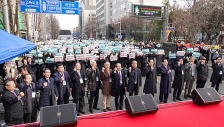

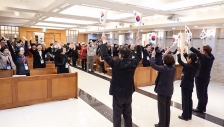
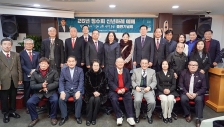






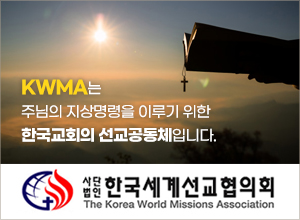
![[이미지 묵상] 그런즉 누구든지 그리스도 안에 있으면 새로운 피조물이라 이전 것은 지나갔으니 보라 새 것이 되었도다 (고후 5:17)](https://missionews.co.kr/data/images/full/14265/5-17.jpg?w=196&h=128&l=50&t=40)
![[이미지 묵상] 한번 죽는 것은 사람에게 정해진 것이요 그 후에는 심판이 있으리니 (히 9:27)](https://missionews.co.kr/data/images/full/14264/9-27.jpg?w=196&h=128&l=50&t=40)
